#WrestleOslo: Gray Grabs 6th World Title as Teen Fujinami Lives Up to Hype
Wednesday, October 6, 2021 - 18:28 By Ken Marantz

OSLO, Norway (October 6) -- As Adeline GRAY (USA) maintained her tenuous grip on the women's 76kg title by winning a U.S.-record sixth world gold, teenager Akari FUJINAMI (JPN) put on a golden performance well beyond her years.
Gray was forced to rally before securing a last-second fall over Epp MAEE (EST) in the 76kg final to cap a historic fifth day of action at the World Championships in Oslo on Wednesday.
"I am a smart wrestler and adjust and that's what smart wrestlers do -- make mid-match adjustments," Gray said. "My coach helped me understand where my power was and found a few positions where my strength really is."
Fujinami, a 17-year-old dynamo making her international senior debut, stole the show at the Jordal Amfi arena by storming to her fourth straight technical fall -- all without conceding a point -- to take the 53kg gold by crushing Iulia LEORDA (MDA).
Moldova, denied first by Fujinami, got its first-ever female world champion in the next final, when Irina RINGACI (MDA) forged out an 8-6 victory over Miwa MORIKAWA (JPN) at 65kg in a clash of current and past world junior champions.
"Here as well as at the junior worlds, we have a small team, only three girls flew in Norway, and two out of three got medals," Ringaci said. "We have made history for our country."
Japan won the other women's title at stake, when 2019 world cadet champion Remina YOSHIMOTO (JPN) came from behind in the 50kg final to defeat Tokyo Olympic bronze medalist Sarah HILDEBRANDT (USA) 5-3.

Two days after Jordan BURROUGHS (USA) joined Gray as a five-time world champion by winning the freestyle 79kg gold, she became the sole U.S. leader again by taking a sixth.
"Great feeling," Gray said. "Better than five times is six. Sixth one feels good. Jordan is still chasing me. so that's good."
The victory, however, was never a sure thing until the final minute.
Maee, who previously lost to Gray at the 2014 and 2018 World Championships, seemed to have come up with the right strategy to emulate Aline ROTTER FOCKEN (GER), who stunned the American in the final at the Tokyo Olympics in August.
After gaining an activity point, Maee scored on the edge with a high ankle pick, which became a 4-0 lead after an unsuccessful challenge of the call. In the second period, Gray got on the scoreboard by bulling Maee over for 2.
With :42 left, Gray took the lead on criteria with a takedown off a counter. She then added to the tally with a 2-point trap-arm exposure. It looked like she would run out the clock, but she kept applying the pressure and secured a fall with two seconds left.
"I could have finished the last shot a bit better," Maee said. "It's hard to tell about these things right after the match, but there is still a lot going on here [in the mind]. First period, I really thought I was in control, but at this level one mistake matters everything.

Gray added to the world titles she won in 2012, 2014, 2015, 2018 and 2019, giving her a total of eight world medals. Adding to her elation was the fact that her latest gold came with falls in all four matches.
"How many times do you pin your way to the world title?" Gray said. "I was so jealous when Helen [MAROULIS] did it, or Yui [SUSAKI] doing 42-0 at the Olympics. I mean that's dominance. That's power. That's dynamic wrestling and not letting people score. To have four pins in a world championship, I've never done that."
Gray accomplished the feat despite problems dealing with the fast turnaround trying to get ready for Oslo so soon after the Olympics.
"It was a struggle every single day and my coaches were talking me into it," Gray said. "It's just too short of a time period to cope with everything that happened."
While Japan did not enter its Olympians, which included four women's gold medalists, nor was China entered at all, Gray was among all but one U.S. medalist who committed to participating in Oslo.
"That buzzing high kind of stayed through the Olympics because 14 days later we had to decide if we had to do this world or not," Gray said. "Especially when we saw the lineup of the people and how many No. 1s were not there. I looked up to [U.S. coach] Terry [STEINER] and asked why we were sending our No. 1s. So it was just a lot of decisions through the way.
"I am glad we did this but it's hard and wouldn't recommend it."

Fujinami, a 2018 world cadet champion, came to Oslo amid a mountain of hype and high expectations, despite the fact that her only other senior-level tournaments were the two national championships over the past year that served as qualifiers to the World Championships.
Fujinami won both, beating a two-time world champion and a world silver medalist along the way at each. She has not lost since the final at the 2017 national junior high school championships and, adding in the four victories in Oslo, now has an 83-match win streak.
"I feel amazing, I am so grateful, thank you to my family, my friends, my teammates, the people who supported me," Fujinami said in English, before continuing her post-match comments in Japanese.
In the final, Fujinami blitzed Leorda with a barrage of lightning-quick single-leg takedowns, ending a 10-0 rout with a 2-point exposure at 2:14.
Fujinami had said before the tournament that she felt excited instead of nervous, and that's how she described her feeling before the final.
"Everyone says I'm 17 and I'm young, but thinking about all the time I've put into wrestling up to now, I think the time I spent thinking about wrestling wasn't wasted," she said. "I think the reason [for being excited] was how confident I was taking the mat."
With the one-sided victory, Fujinami ended up with four wins by a combined score of 41-0.
"I don't really think about not giving up a point," she said. "I only keep in mind to keep attacking. And that just leads to these results."
Asked if any of her wins stood out above the others, she said, "Really, all of them left an impression. It's a first experience for me. All of the matches will be remembered. I'm really happy to be able to compete on this stage. I really want to get back to this stage and win again many times."
Fujinami, who is coached by her father at Inabe Gakuin High School in central Japan's Mie Prefecture, said she received encouragement from her classmates.
"Before the final, our teacher sent a video of everyone together saying 'Ganbare (fight hard)! That made me really happy," she said. "It made me feel they were really behind me and I had to win for them."

Looking ahead, Fujinami is ready to clash with Tokyo Olympic 53kg champion Mayu MUKAIDA (JPN) in her quest to make it to the 2024 Paris Olympics. The gold in Oslo only adds to her confidence.
"Mukaida is a really strong wrestler," Fujinami said. "From the time I was small, I looked up to her. She is strong, but I am absolutely determined to be the one going to Paris [in 2024]. When the time comes to face her, I definitely want to win."
Leorda, this year's European bronze medalist, joined Ringaci as Moldova's first-ever female world medalists, although she would not become the first to get to the top of the podium.
Still, a silver is a noteworthy accomplishment for a wrestler who had never placed higher than seventh at seven previous World Championships.

At 65kg, the 20-year-old Ringaci came out on top by wrestling a tactically strong match, continually fending off the aggressive 2019 world junior champion Morikawa and scoring on counters.
After Ringaci scored two takedowns in the first period, Morikawa finally broke through with a double-leg takedown to start the second. But Ringaci picked up a crucial 4-point counter to go ahead 8-2, then held on as Morikawa scored two takedowns late in the match.
"All the matches were tough," Ringaci said. "The Japanese girls are the best in the world in women wrestling, so it was really difficult to wrestle in the final, especially to win."
Ringaci nearly lost out on her chance to make history for her country when she trailed 8-2 in her semifinal against Mimi HRISTOVA (BUL), only to use a counter to reverse the tide and score a fall.
"It’s really emotional," Ringaci said. "I have no words to explain it. I am just really happy."
Ringaci has had quite a year, winning both the European senior and U23 titles before taking the world junior crown two months ago in Ufa, Russia. Her only slip-ups were at the two Olympic qualifiers and the European juniors.
She said she does not plan to go for a "triple crown" at the world U23 next month in Serbia.
"I think I showed quite a good result at senior worlds, so I’ll give the change to somebody else to wrestle at the U23 worlds," Ringaci said.

With Japan's Olympians opting not try to make the team to Oslo, Yoshimoto made the most of a rare chance to compete on the senior level at 50kg, where Tokyo gold medalist Susaki has become a fixture.
In the final, Hildebrandt, the 2018 world silver medalist at 53kg, took a 3-0 lead on an activity point and 2-point exposure off a counter, before Yoshimoto cut the gap with a takedown to end the first period.
"She's a veteran, and I can feel her strong determination," the soft-spoken Yoshimoto said. "But I was determined to not lose and to fight to the end, and it was good that I did it."
Yoshimoto went ahead on criteria with a stepout, then clinched the win with a 2-point exposure off a wild scramble in which both wrestlers had a grasp of an ankle or thigh.
"I wasn't able to attack much, but I could stop her when I needed to stop her, and I got points when I could," Yoshimoto said. "I made it smoothly to the final, but the final wasn't so easy.
"I had confidence in my strength during the match, and in the second period, I was thinking that I definitely wanted my hand to be raised at the end."
Yoshimoto's ability to hold up in the pressure-cooker that is a World Championships stems from being on the team at Shigakkan University, the powerhouse that has produced innumerable world and Olympic champions, many of whom still train there after graduating.
"I got advice from many people, Risako [KAWAI], Yukako [KAWAI], Eri [TOSAKA]," Yoshimoto said. "Risako and Yukako always helped with techniques. That I was able to make good use of what I learned, I see as a way of honoring them."
Asked about knocking Susaki off the 50kg perch, Yoshimoto said, "I will keep practicing and work to get stronger not only physically, but technically and emotionally. We will probably butt heads someday, so until then, I want to get stronger and challenge her."

In the bronze-medal matches, Samar HAMZA (EGY) added Egpyt to the list of countries with a female world medalist when she became the country's first with a 2-1 win over Kiran GODARA (IND) at 76 kg.
Hamza, a four-time African champion and two-time Olympian, scored a double-leg takedown in the first period and made that hold up to notch the historic victory.
Hamza, the product of a UWW scholarship program to help prospective wrestlers in emerging countries, had one of the more entertaining bouts at the Tokyo Olympics when she lost a 16-12 barnburner in the first round to Natalya VOROBIEVA (ROC).
Two-time Asian silver medalist Aiperi MEDET KYZY (KGZ), who finished fifth at the Tokyo Olympics, earned her first world medal with a 12-1 rout of 2018 European U23 champion Anastasiia OSNIACH SHUSTOVA (UKR) for the other bronze at 76kg.
Medet Kyzy finished off a second takedown with three lace-lock rolls to end the proceedings in 1:39.
At 53kg, Katarzyna KRAWCZYK (POL) denied a bid by Luisa VALVERDE (ECU) to become her country's first-ever world medalist of either gender when she rode a 4-point arm throw to a 7-1 victory.
The victory gave Krawczyk, a 2018 European bronze medalist, her first world medal after two fifth-place finishes in five previous World Championships dating back to 2011.
The other bronze went to 2016 Pan American champion Samantha STEWART (CAN), who gave 2018 world U23 bronze medalist Khrystyna BEREZA (UKR) no chance by backtripping her to the mat and securing a fall in 1:59.

At 50kg, unheralded Otgonjargal DOLGORJAV (MGL) showed no fear in overpowering two-time world runner-up Emilia VUC (ROU) for a 10-0 technical fall.
Dolgorjav, the 2018 world cadet silver medalist appearing in just her fifth senior-level event, stormed to an 8-0 first-period lead when she fought off a headlock for a takedown, immediately went to two gut wrenches, then added a takedown.
In the second period, she scored the decisive takedown off a single at 4:18 to finish off Tokyo Olympian Vuc, denying her a third world medal just two days after her 28th birthday.
The other 50kg bronze went to two-time world U23 medalist Nadezhda SOKOLOVA, who had a pair of 4-point moves in a 12-2 technical fall over Bohdana KOKOZEI YASHCHUK (UKR).
Sokolova used a headlock for her first 4-pointer, then later dumped the Ukrainian with a fireman's carry to end the match at 2:29.
At 65kg, Forrest MOLINARI (USA) finally made the medal podium after two previous fifth-place finishes by overwhelming 2016 Rio Olympic silver medalist Maryia MAMASHUK (BLR) with a 12-1 technical fall in 4:50.
Johanna MATTSSON (SWE) picked up her second world bronze, adding to the one she won back in 2010, without a fight when Mimi HRISTOVA (BUL) defaulted the other match at 65kg.

Day 5 Results
Women's Wrestling
50kg (20 entries)
GOLD: Remina YOSHIMOTO (JPN) df. Sarah HILDEBRANDT (USA), 5-3
BRONZE: Nadezhda SOKOLOVA (RWF) df. Bohdana KOKOZEI YASHCHUK (UKR) by TF, 12-2, 2:29
BRONZE: Otgonjargal DOLGORJAV (MGL) df. Emilia VUC (ROU) by TF, 10-0, 4:10
53kg (17 entries)
GOLD: Akari FUJINAMI (JPN) df. Iulia LEORDA (MDA) by TF, 10-0, 2:14
BRONZE: Katarzyna KRAWCZYK (POL) df. Luisa VALVERDE (ECU), 7-1
BRONZE: Samantha STEWART (CAN) df. Khrystyna BEREZA (UKR) by Fall, 1:59 (4-0)
57kg (17 entries)
Semifinal: Helen MAROULIS (USA) df. Sae NANJO (JPN), 6-4
Semifinal: Anshu MALIK (IND) df. Solomiia VYNNYK (UKR) by TF, 11-0, 3:54
59kg (17 entries)
Semifinal: Akie HANAI (JPN) df. Maya NELSON (USA), 4-1
Semifinal: Bilyana DUDOVA (BUL) df. Sarita MOR (IND), 3-0
65kg (19 entries)
GOLD: Irina RINGACI (MDA) df. Miwa MORIKAWA (JPN), 8-6
BRONZE: Johanna MATTSSON (SWE) df. Mimi HRISTOVA (BUL) by Def.
BRONZE: Forrest MOLINARI (USA) df. Maryia MAMASHUK (BLR) by TF, 12-1, 4:50
68kg (15 entries)
Semifinal: Rin MIYAJI (JPN) df. Tamyra MENSAH STOCK (USA) by Fall, :20 (2-0)
Semifinal: Meerim ZHUMANAZAROVA (KGZ) df. Khanum VALIEVA (RWF), 3-3
72kg (14 entries)
Semifinal: Zhamila BAKBERGENOVA (KAZ) df. Buse CAVUSOGLU TOSUN (TUR) by TF, 13-2, 5:44
Semifinal: Masako FURUICHI (JPN) df. Anna SCHELL (GER), 6-2
76kg (18 entries)
GOLD: Adeline GRAY (USA) df. Epp MAEE (EST) by Fall, 5:58 (6-4)
BRONZE: Samar HAMZA (EGY) df. Kiran KIRAN (IND), 2-1
BRONZE: Aiperi MEDET KYZY (KGZ) df. Anastasiia OSNIACH SHUSTOVA (UKR) by TF, 12-1, 1:37

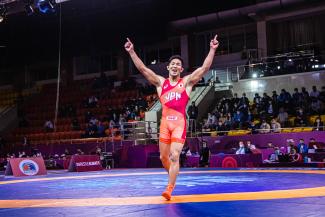
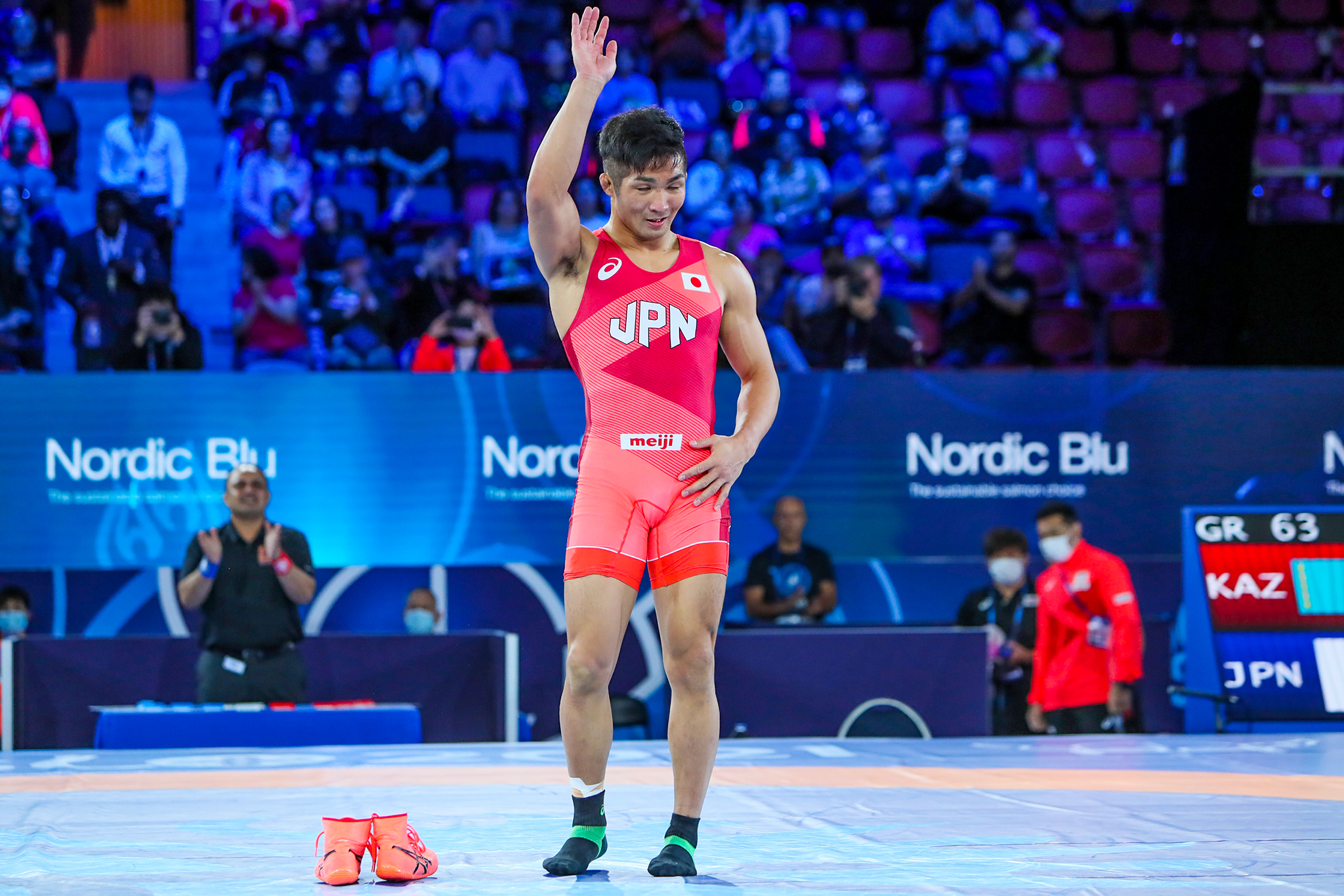 Tsuchika SHIMOYAMADA (AUS) had left his shoes on the mat during the 2021 World Championships to mark his retirement. (Photo: United World Wrestling / Martin Gabor)
Tsuchika SHIMOYAMADA (AUS) had left his shoes on the mat during the 2021 World Championships to mark his retirement. (Photo: United World Wrestling / Martin Gabor)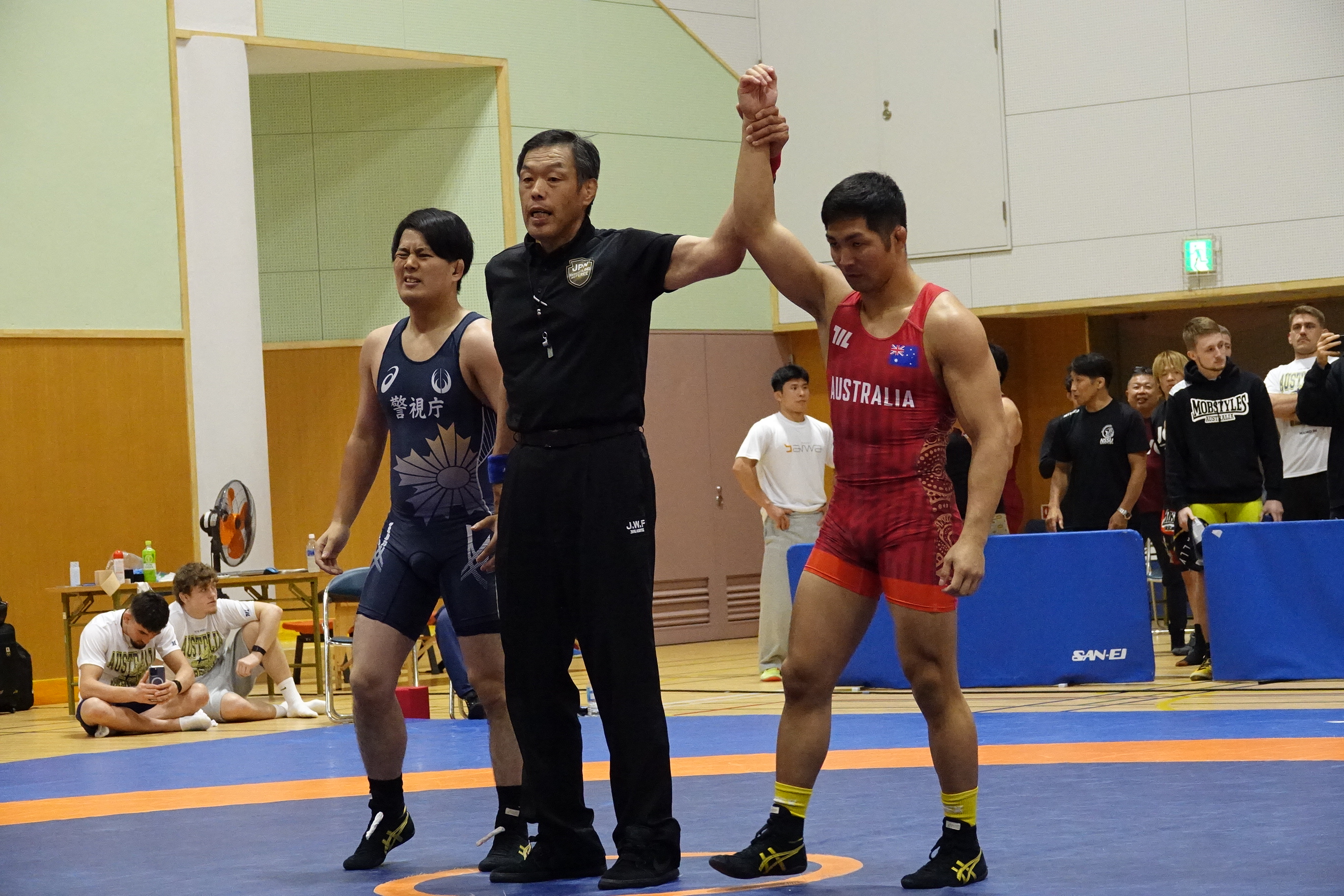 Tsuchika SHIMOYAMADA advances to the semifinals at the All-Japan Non-Student Championships in July with a 52-second win over Kokoro GOTO. (Photo: Koji Fuse / wrestling-spirits.jp)
Tsuchika SHIMOYAMADA advances to the semifinals at the All-Japan Non-Student Championships in July with a 52-second win over Kokoro GOTO. (Photo: Koji Fuse / wrestling-spirits.jp)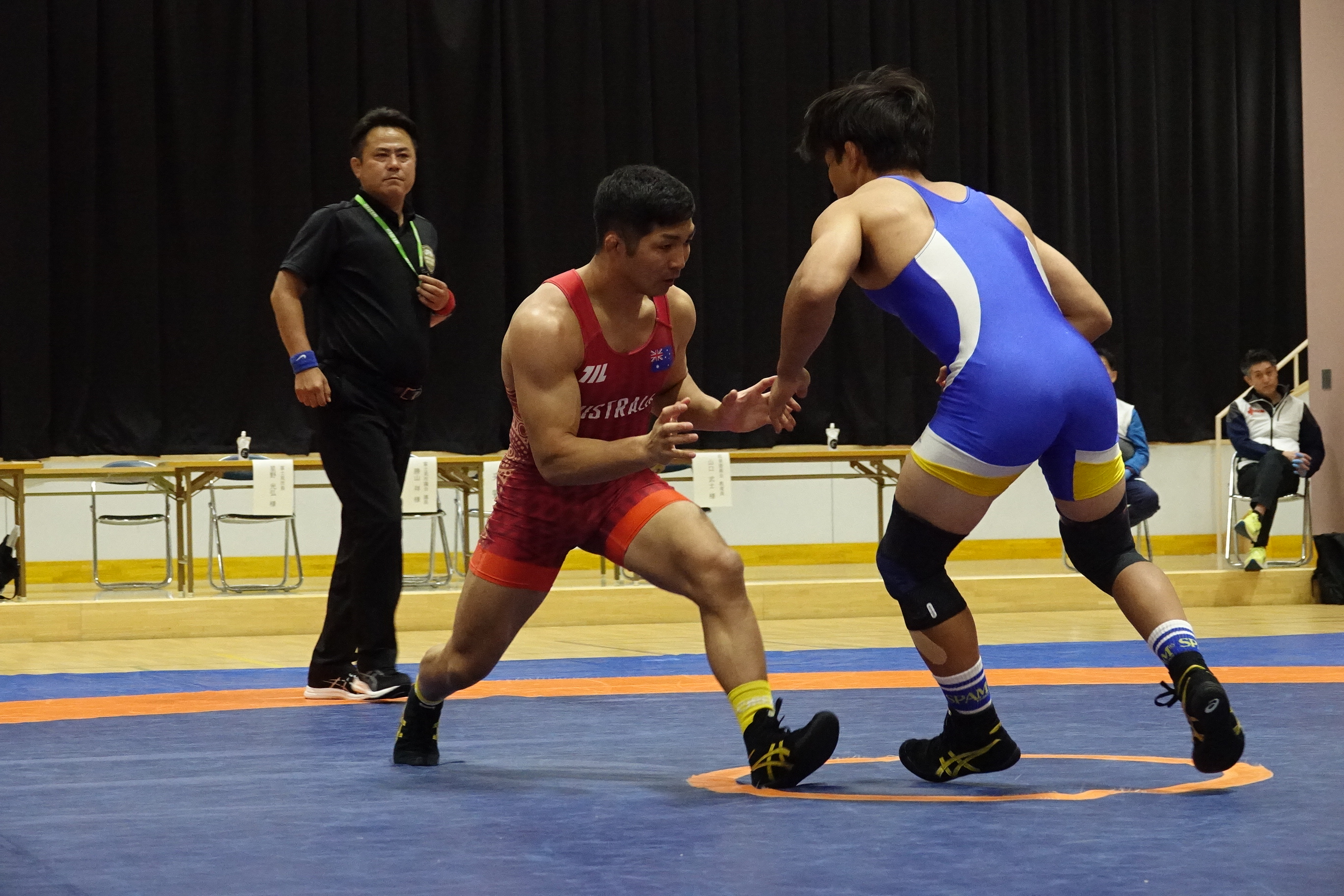 Tsuchika SHIMOYAMA faces Keitaro ONO in his opening match at the All-Japan Non-Student Championships in July. (Photo: Koji Fuse / wrestling-spirits.jp)
Tsuchika SHIMOYAMA faces Keitaro ONO in his opening match at the All-Japan Non-Student Championships in July. (Photo: Koji Fuse / wrestling-spirits.jp)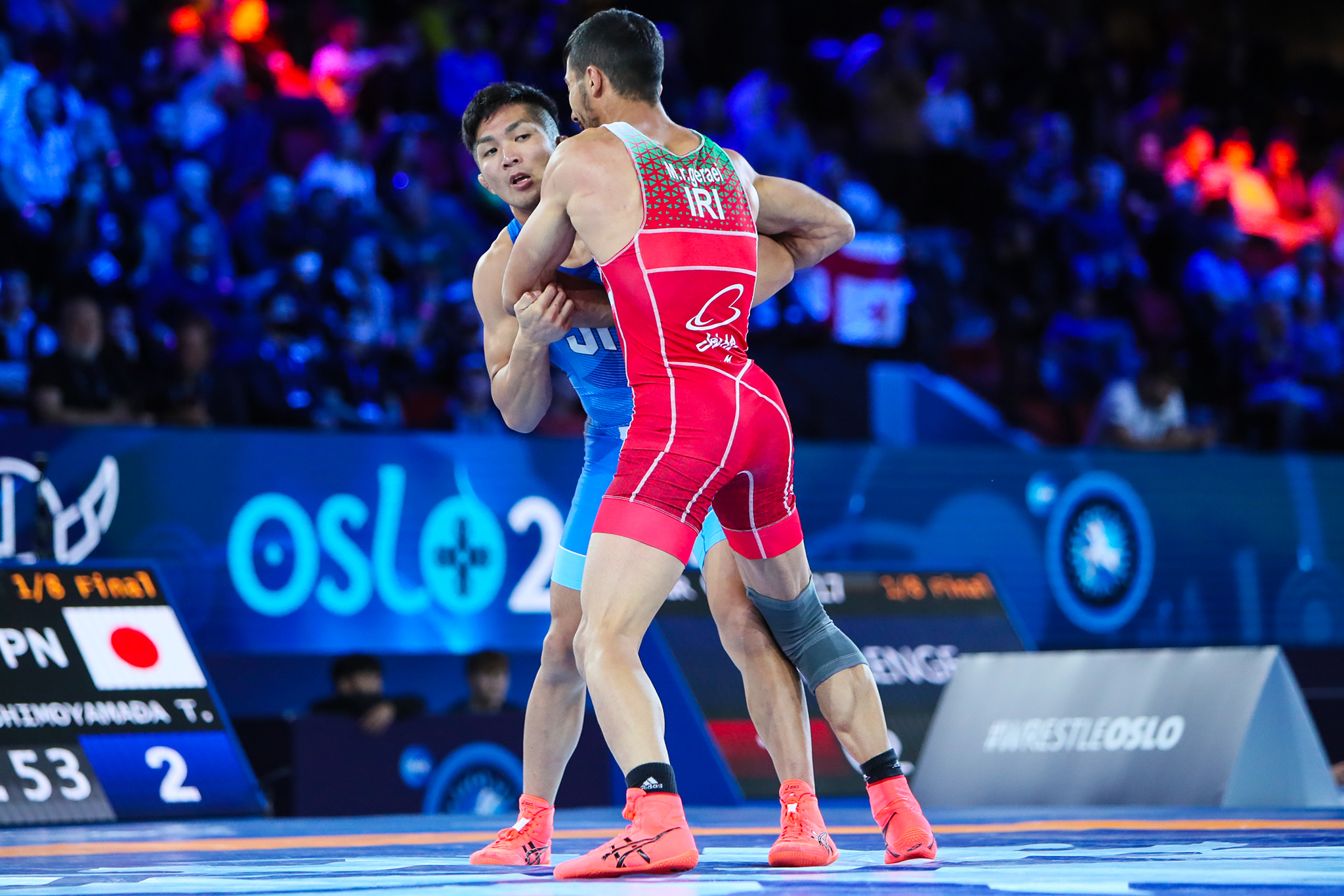 Tsuchika SHIMOYAMADA (AUS) was dominating Mohammadreza GERAEI (IRI) in their match at the 2021 World Championships before being pinned. (Photo: United World Wrestling / Martin Gabor)
Tsuchika SHIMOYAMADA (AUS) was dominating Mohammadreza GERAEI (IRI) in their match at the 2021 World Championships before being pinned. (Photo: United World Wrestling / Martin Gabor)
Share your thoughts.
Comments